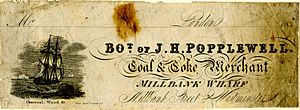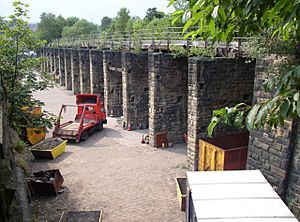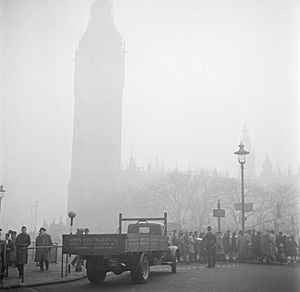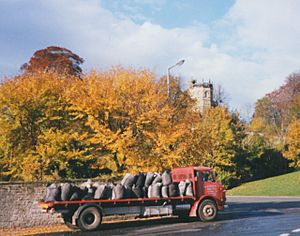Coal merchant facts for kids
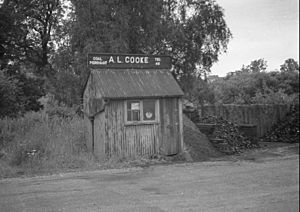
A coal merchant was a business or person who sold coal. They often delivered it directly to homes. In the past, coal merchants were very common. Many homes used coal for heating and cooking. Today, they are less common because people use other ways to heat their homes. These include central heating, gas, oil, and electric heating. The workers who carried the coal to houses were known as coal men.
In 1975, the UK government estimated that a typical home using solid fuel (like coal) burned about 4.7 tons each year. That's a lot of coal!
The History of Coal Merchants
Long ago, a "coal merchant" could mean someone who owned a ship that carried coal. But later, the term was used for anyone who traded coal, even small sellers.
When railways became popular in the UK, coal merchants often set up their businesses at railway stations. Coal would arrive by train in the goods yard. Coal could also come by canal boat or by ship. Sometimes, if a home was close to a coal mine, coal was sold directly from the mine. This was called "landsale".
After arriving, the coal was moved by cart or truck to local homes and businesses. Sometimes, it was put into a coal hole. This was a special hatch that led down to a cellar for storage.
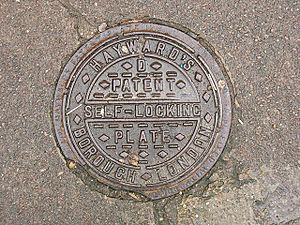
Most coal merchants were small, local businesses. However, some larger companies also existed. They might buy their coal from a "coal factor" or "coal broker". Carrying heavy sacks of coal was very hard work. It could cause injuries to the workers. In some places, like Gelderland in the Netherlands, coal was often delivered in summer. This was when the weather was dry, which helped keep homes cleaner.
Changes After World War II
After World War II, there was a time of hardship. The National Coal Board (a government company) encouraged people to use lower-quality coal called "nutty slack". This allowed better coal to be sold to other countries or used for other important things.
However, burning coal caused a lot of air pollution, especially in cities. This led to thick fog mixed with smoke, known as smog. To fix this, the Clean Air Act 1956 was passed in the UK. This law aimed to make people switch to cleaner fuels that produced less smoke.
In 1962, the National Coal Board and coal traders created a special mark. It was called the "Approved Coal Merchant" mark. This mark showed that a coal merchant met certain standards. This mark still exists today.
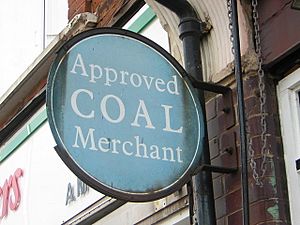
From the 1950s, British Railways started to reduce how much coal was sent to individual railway stations. This was part of changes known as the Beeching cuts. Coal merchants then often received their coal by road. The coal would come from large "coal concentration depots". These depots received huge trainloads of coal. Even so, many coal merchants continued to operate from station yards.
Around the 1990s, fewer trains carried coal. This led to many of the large coal concentration depots closing down.
Coal merchants have become less common because of new heating methods. One merchant in Swindon explained why he sold his business in 2015. He said that while business was good, it wasn't growing. He noted that with natural gas and electric cookers becoming popular, the demand for coal was decreasing.
See also
- Coal-tax post
 | Percy Lavon Julian |
 | Katherine Johnson |
 | George Washington Carver |
 | Annie Easley |


